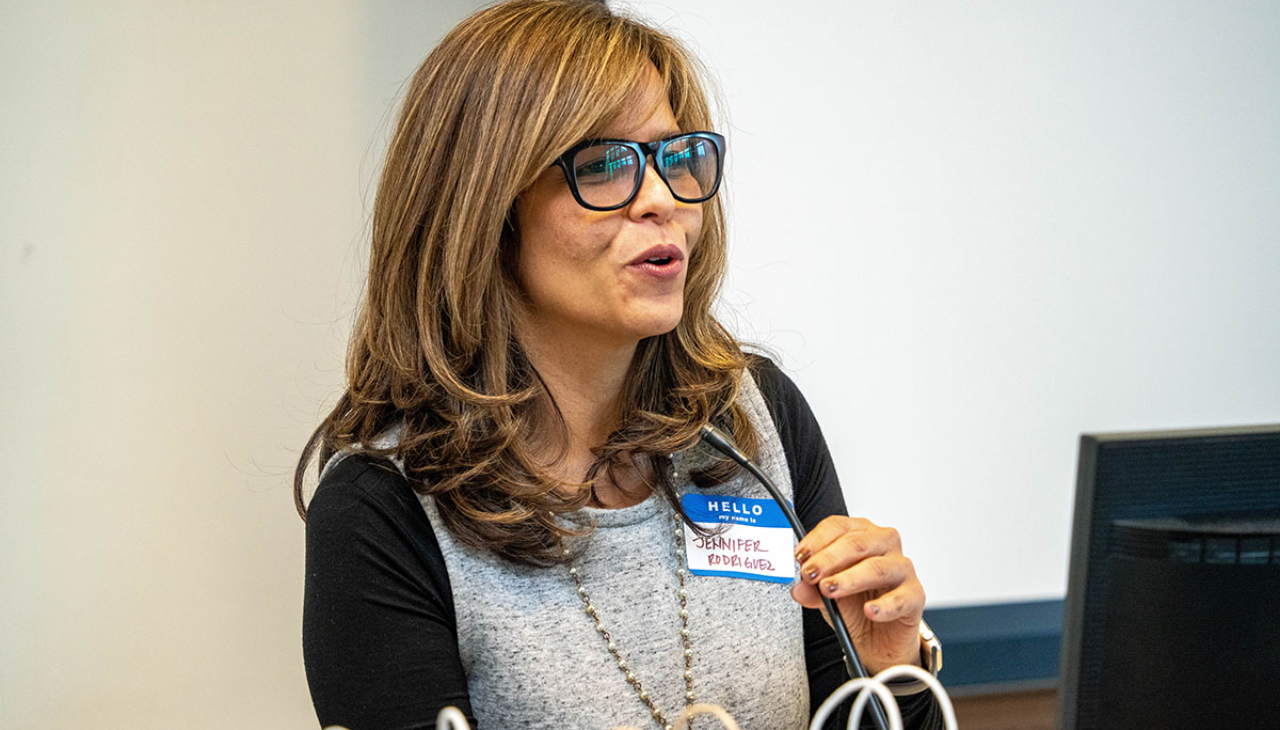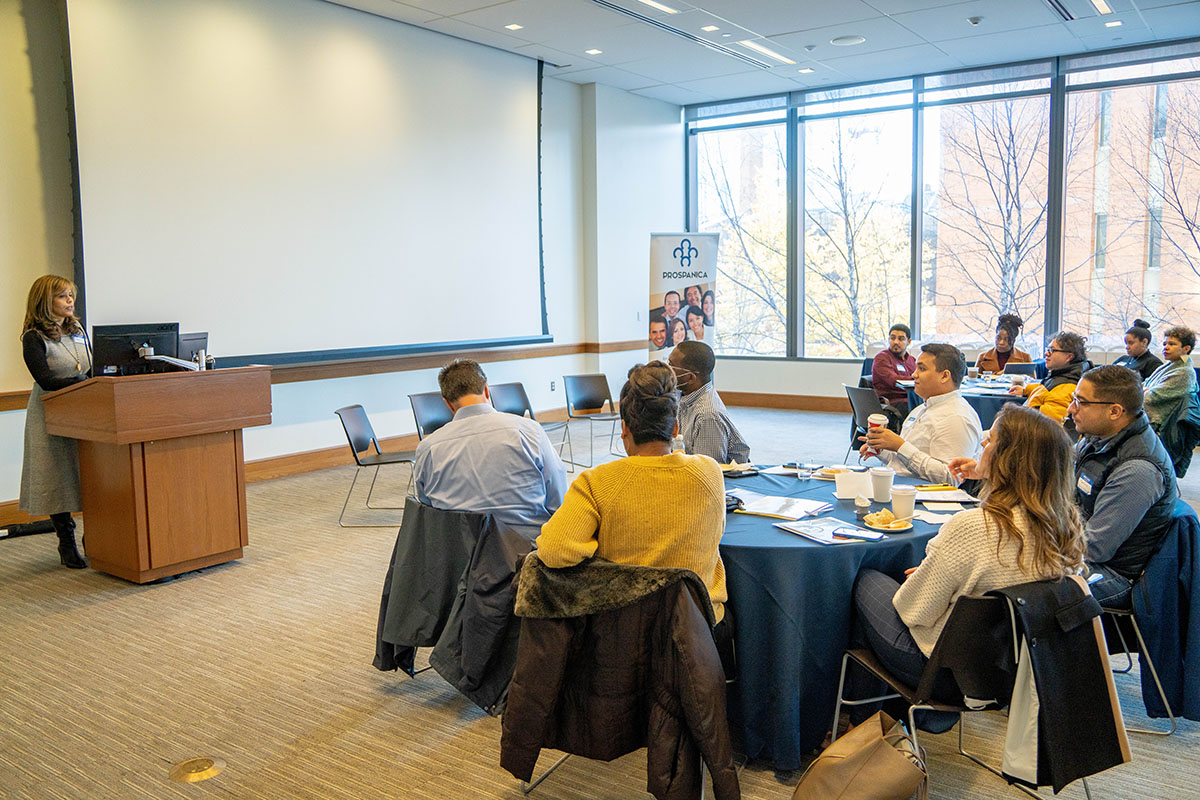
With equitable access to resources, Latinos deliver. But what plays into the inequality?
Jennifer Rodriguez, President & CEO of GPHCC, served as keynote speaker of the 2022 Prospanica ERG Summit, and painted a glaring picture of how things are.
“We [Latinos] as a people, as a group, have not fully harnessed our civic, social and economic power.”
Those were the words of Jennifer Rodríguez, President and CEO of the Greater Philadelphia Hispanic Chamber of Commerce.
On Friday, December 2, Prospanica PHL hosted its 5th annual ERG and Diversity Leadership Summit at Drexel University’s Lebow College.
At the event, Rodríguez served as the keynote speaker, where she provided a chock-full of information about realities facing Latinos, the state of Hispanic entrepreneurship in the Philadelphia region, and the dedicated work being led by the Hispanic Chamber to improve conditions for its entrepreneurs.
As it pertains to the aforementioned notion that Latinos have not fully harnessed the civic, social and economic power they possess, Rodríguez shared three ways in which that power can be harnessed.
They are: improving educational outcomes, voting at higher rates, and scaling businesses.
“In Philadelphia, the gap between our current conditions and our potential is pretty stark. There is a lot of room for improvement,” she said.
As President & CEO of the Hispanic Chamber, Rodríguez and her team lead various efforts to fulfill what she classifies as “The Hispanic Promise,” a commitment toward realizing that goal — through entrepreneurship.
A Look at the Numbers
Philadelphia is the most economically disadvantaged large city in the country, with more than 23% of the population living below the poverty line. For Hispanics, that number balloons to 40%, compared to 15% for the White population.
For Latinos, the bachelor’s degree attainment rate is about 17%, compared to 47% for the White population.
In addition, Latino businesses generate close to half a million dollars less in revenue than their white counterparts.
“Latinos are not only the poorest demographic group in Philadelphia, but we are amongst the poorest Hispanics in the nation,” said Rodríguez, noting that the poverty rate has remained largely unchanged since the 1970s.
“Meanwhile, our population has doubled,” Rodriguez highlighted.
Despite a much higher Latino population in the city, the poverty rate remains alarmingly high.
“Simply put, we have multiplied poverty,” said Rodríguez.
The federal government classifies poverty as an individual making less than $13,590 a year. For a family of four, poverty is classified as income less than $27,750 a year.
“Poverty is Complex”
However, Rodríguez notes that poverty is much more than simply how much income an individual or family makes.
“Poverty is complex,” she said. “It’s a condition caused by a combination of factors, which varies from individual to individual, and is often passed from one generation to the next.”
The World Bank defines poverty as “the deprivation of well-being.”
In addition to low income, poverty includes the inability to acquire basic necessities toward “survival with dignity.”
When Rodríguez thinks about the challenges plaguing Philadelphia, she believes it has little to do with income, and everything to do with dignity.
“In other words, it is not only about having adequate financial resources, but also having the ability to make choices, have control, autonomy, and power to enjoy a decent standard of living,” she expressed.
To this end, decreasing poverty for Latinos in Philadelphia will require much more than simply helping the population increase their income levels.
This ties back to the three ways Rodríguez noted previously about how to help Hispanics fully harness their potential — plus, several others.
“It requires improvement in health, education, housing, work opportunities, and the environment, including safety,” she added.
However, preserving an individual’s dignity while addressing these factors should remain at the core.
Entrepreneurship Equaling Wealth?
“At the GPHCC, we strongly believe that entrepreneurship is a viable and valid tool for creating wealth and improving the well-being of Latinos in Philadelphia,” said Rodríguez.
She added that while entrepreneurship won’t solve poverty on its own, “it can certainly impact the conditions that cause it.”
Owning a business can help individuals obtain independence and control of their lives, empowering them to make important decisions, including what products to sell, which services to provide, where to provide them, and how.
The ability to have autonomy over these decisions brings dignity to many’s lives.
Latinas have been the driving force of entrepreneurship within the community, being six times more likely to start a business than the average person.
“Latinas seek work-life balance, they seek flexibility and control over their lives, and entrepreneurship delivers that,” said Rodríguez.
As Latinos have historically had lower educational attainment rates than their white counterparts, it has led to depressed income and wealth levels.
As a result, entrepreneurship has been among the most viable components that have led many to achieve self-sufficiency for many Latinos, and immigrants alike.
In recent years, immigrants have accounted for about 96% of new businesses along street corridors across the nation — many of which are Latino immigrants.
RELATED CONTENT
“In so many ways, we are the backbone of our neighborhoods; the backbone of our economy,” said Rodríguez.
A Future Where Potential Meets Reality
Rodríguez uses the story of Cristina Martinez as a prime example of what entrepreneurship could have the power to do.
Today, she is a widely-known food entrepreneur and activist — chef, owner of Casa Mexico and South Philly Barbacoa, and a James Beard Award winner.
However, less than a decade again, she arrived to the United States as an immigrant from Mexico, selling barbacoa out of a cart.
“Not legally able to become employed, deprived from well-being and unable to acquire the basic goods and services necessary for survival with dignity… she found entrepreneurship as an avenue to create wealth, provide jobs and become civically engaged,” said Rodríguez.
She noted that Philadelphia would be completely transformed if Martinez’s story could be replicated over and over again.

According to Rodríguez, there are approximately 11,000 Latino solo entrepreneurs and 700 employer businesses in Philadelphia.
“If they were growing modestly — just by one or two employees — we would be creating about 22,000 jobs in the neighborhoods that need it most,” she said.
This is something that Rodríguez believes can be done, so long as Latino entrepreneurs are provided with the resources and network they need.
These are two things that the Hispanic Chamber has provided Latino entrepreneurs since its establishment in 1990.
With more recent programs, such as Accelerate Business — formerly known as Accelerate Latinx — Latino businesses in Philadelphia have grown, success has been had, and profits have been made — despite the challenges brought on by the pandemic.
“According to some reports, the economy has lost about 40% of Black and Brown businesses as a result [of the pandemic],” said Rodríguez.
However, for those businesses that participated in the Accelerate program, that number is at zero, and 88% of those businesses reported being profitable.
These statistics paint a clear picture, highlighting that when Hispanic business owners are given the tools and equitable access needed to succeed, they often deliver.
“With quality programs, access to networks, and capital, Hispanic businesses have the potential to transform our community. It is therefore our responsibility to advocate for an equitable share of resources and capital to support Latino entrepreneurship,” Rodríguez highlighted.
“And the time is now,” she added.
As Philadelphia will soon be under a new mayoral administration, Rodríguez believes now is a critical turning point in determining the direction of our city.
Will we renew the growth and development that has been seen since the onset of the pandemic, or revert back to the decline reminiscent of the post-industrial era when Philadelphia lost roughly 500,000 residents?
As a call to action, Rodríguez encourages Latinos to aim high, take ownership of the conditions of the community, and its future “because it is in your hands,” she said.
Taking leadership positions can go a long way toward helping the Latino community fulfill the tons of potential it has.
“Because we know that the more people that are in positions or power, or influence, and decision-making, the better off our businesses will be,” concluded Rodríguez.











LEAVE A COMMENT: